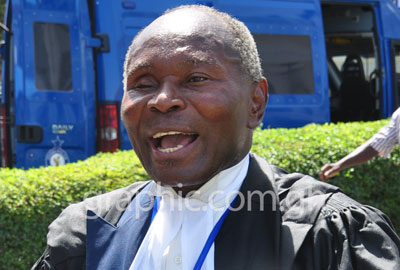Full story: Amicus Curiae shot down

Advertisement
The court held that the applicant did not show any grounds for a review of its decision given on May 3, 2013.
Mr Amekudzi, who filed the application as a friend of the court (amicus curiae) looked unprepared and even made misleading references to clauses in the 1992 Constitution by referring to them as sections.
That aside, his appearance in court did not serve a bad purpose at all, as his antics became a source of entertainment, with the people in the courtroom, including the judges, laughing their hearts out to release some tension.
Even when he was corrected, Mr Amekudzi would not listen but continued until he was finally cut short that all he had said would be considered by the court.
On May 3, 2013, Amekudzi’s original application was thrown out by the court on the grounds that his concerns had been taken care of by the Constitution and other laws.
According to him, the President of the court overlooked a serious constitutional provision that a sitting President could not be sued.
He claimed that his application was brought in the interest of justice, protection of the rule of law and fairness and that when certain cases were being adjudicated upon by the court, a friend of the court could be entertained to assist on legal points.
Arguing his case yesterday, Mr Amekudzi said the court ought to have made a determination on his application before entertaining what he referred to as the “frivolous petition of the petitioners against a sitting President’’.
He said the court, in its decision to dismiss his original application, grossly erred on the face of the records and that was a slap in the face of freedom of justice.
The court, he argued, was wrong when it relied on provisions in the Constitution and the rules of the court to dismiss his original application, pointing out that the framers of the Constitution never contemplated that a sitting President could be sued.
Mr Amekudzi then launched himself into a comedy of errors by referring to clauses in the Constitution as sections, whereupon his attention was drawn to that by the President of the court, Mr Justice William Atuguba, who said it was only the transitional provisions in the Constitution which were in sections.
The Constitution, he said, contained articles and clauses.
When Mr Amekudzi brushed off the advice, he was brought back on track by Mr Justice Jones Dotse, who reminded him that he seemed not to have got the import of the President’s advice, but Mr Amekudzi still persisted in his mistaken reference and argued his case out.
The applicant, who sounded European in his pronunciation of some local names, was asked by Mr Justice Dotse to bring his pronunciation to the Ghanaian level.
He threw his hands in the air and stamped his foot on the ground when he was asked by Mr Justice Anin Yeboah where his statement of case was, since the application was supposed to be accompanied by a statement of case.
In his reply, Mr Amekudzi said his statement of case was that the court erred in law by throwing him out the last time.
At that point, Mr Tony Lithur, lead counsel for President John Dramani Mahama, gave out his rules book to Mr Amekudzi.
“Yes, your Lordships, I am properly before this court,’’ was Mr Amekudzi’s response when asked whether he was properly before the court, in view of the fact that he did not attach any statement of case to his application.
He said the Supreme Court was the highest court of the land and he wanted it to do the proper thing.
At that stage, Mr Justice Dotse asked the applicant whether he still wanted to move the application or take a cue from the bench, in view of the fact that he could not prepare his statement of case because of his bereavement.
“Have my condolence,’’ Mr Justice Dotse told Mr Amekudzi, who veered off totally, saying in his days at the Law School he always made use of the library, but now it seemed all the books could not be traced in the library.
Justice Atuguba told the applicant that it appeared he had covered all the points and asked if he was not done.
The applicant then shouted, “I am, but if it will not go against me,’’ compelling the president of the court to say the application had raised new principles for review.
Lead counsel for the petitioners, Mr Phillip Addison, did not say much, except that he had left the matter entirely in the hands of the court.
Mr Lithur also said the action spoke for itself because the applicant had not exhibited any exceptional circumstances to warrant the review.
Lead counsel for the Electoral Commission (EC), Mr James Quashie-Idun, also did not say much and asked the court to decide as it pleased, while Mr Tsatsu Tsikata, lead counsel for the National Democratic Congress (NDC), said the nature of the application had not satisfied any of the special circumstances to warrant a review.
Before the bench retired to consider a ruling, Justice Atuguba remarked that the application was not entirely frivolous, and that had the applicant not come to court, the court on its own motion could have taken that task upon itself.
In its ruling, the court said although the applicant did not adhere to the procedures of the court, it preferred to look at the submission and, having done so, there was no grounds for reviewing the earlier ruling.
Story: Stephen Sah



